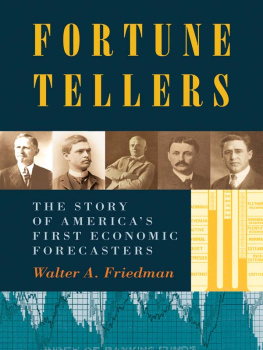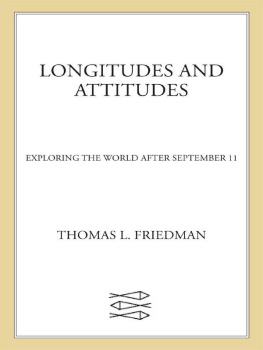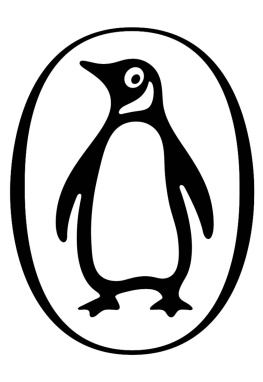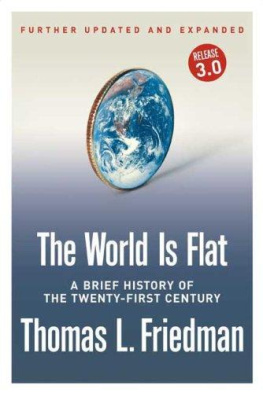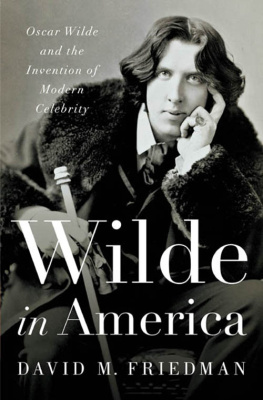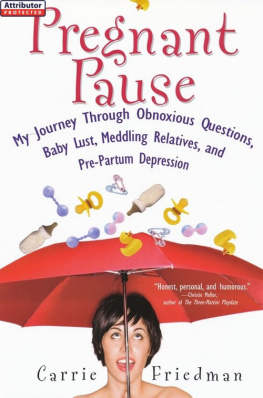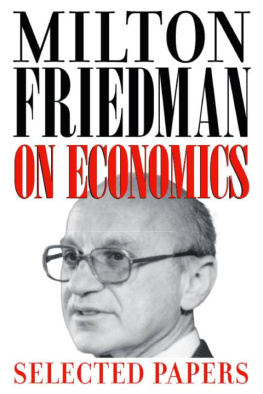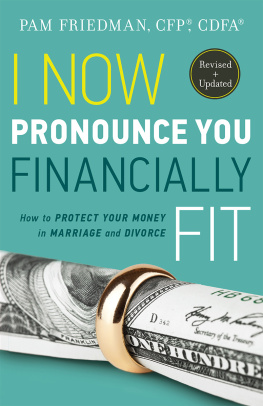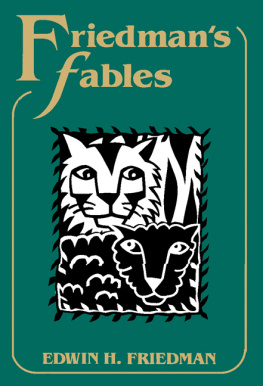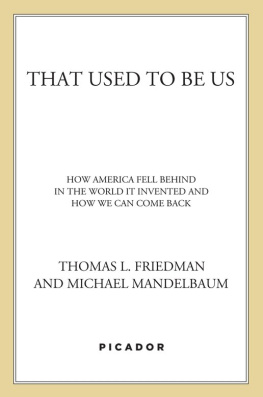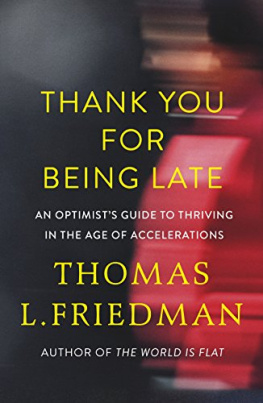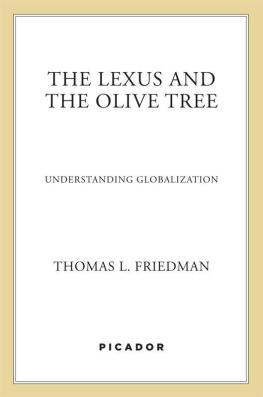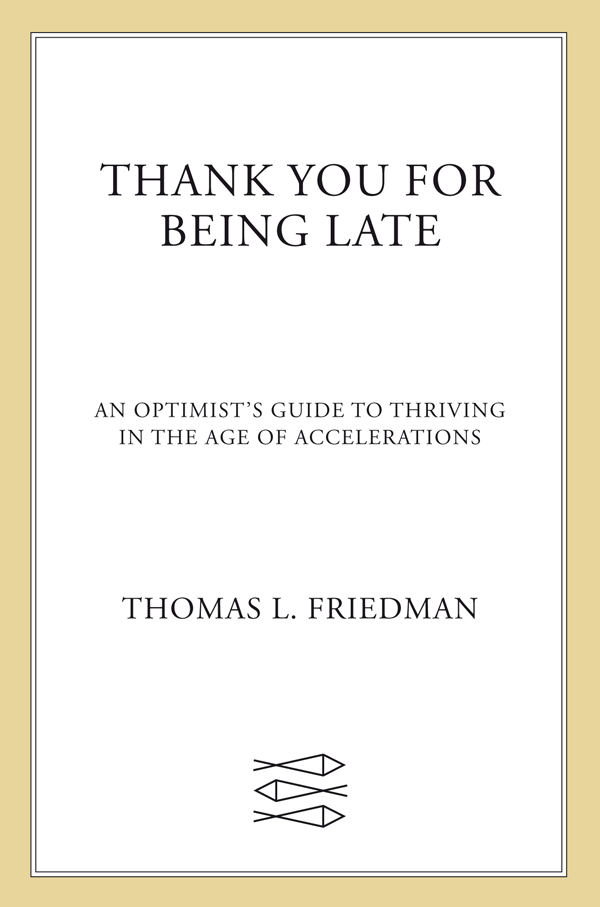Contents
Guide

The author and publisher have provided this e-book to you for your personal use only. You may not make this e-book publicly available in any way. Copyright infringement is against the law. If you believe the copy of this e-book you are reading infringes on the authors copyright, please notify the publisher at: us.macmillanusa.com/piracy.
This is my seventh and, who knows, maybe my last book. Since I published From Beirut to Jerusalem in 1989, I have been extremely lucky to have had a special group of teacher-friends who have been with me on this journey, many starting with that first book and others on virtually every one since. They have been incredibly generous in helping me think through ideasover many years, over many hours, over many books and many columns. So this book is dedicated to them: Nahum Barnea, Stephen P. Cohen, Larry Diamond, John Doerr, Yaron Ezrahi, Jonathan Galassi, Ken Greer, Hal Harvey, Andy Karsner, Amory Lovins, Glenn Prickett, Michael Mandelbaum, Craig Mundie, Michael Sandel, Joseph Sassoon, and Dov Seidman. Their intellectual firepower has been awesome, their generosity has been extraordinary, and their friendship has been a blessing.
Everyone goes into journalism for different reasonsand theyre often idealistic ones. There are investigative journalists, beat reporters, breaking-news reporters, and explanatory journalists. I have always aspired to be the latter. I went into journalism because I love being a translator from English to English.
I enjoy taking a complex subject and trying to break it down so that I can understand it and then can help readers better understand itbe that subject the Middle East, the environment, globalization, or American politics. Our democracy can work only if voters know how the world works, so they are able to make intelligent policy choices and are less apt to fall prey to demagogues, ideological zealots, or conspiracy buffs who may be confusing them at best or deliberately misleading them at worst. As I watched the 2016 presidential campaign unfold, the words of Marie Curie never rang more true to me or felt more relevant: Nothing in life is to be feared, it is only to be understood. Now is the time to understand more, so that we may fear less.
Its no surprise so many people feel fearful or unmoored these days. In this book, I will argue that we are living through one of the greatest inflection points in historyperhaps unequaled since Johannes Gensfleisch zur Laden zum Gutenberg, a German blacksmith and printer, launched the printing revolution in Europe, paving the way for the Reformation. The three largest forces on the planettechnology, globalization, and climate changeare all accelerating at once. As a result, so many aspects of our societies, workplaces, and geopolitics are being reshaped and need to be reimagined.
When there is a change in the pace of change in so many realms at once, as were now experiencing, it is easy to get overwhelmed by it all. As John E. Kelly III, IBMs senior vice president for cognitive solutions and IBM Research, once observed to me: We live as human beings in a linear worldwhere distance, time, and velocity are linear. But the growth of technology today is on an exponential curve. The only exponential we ever experience is when something is accelerating, like a car, or decelerating really suddenly with a hard braking. And when that happens you feel very uncertain and uncomfortable for a short period of time. Such an experience can also be exhilarating. You might think, Wow, I just went from zero to sixty miles per hour in five seconds. But you wouldnt want to take a long trip like that. Yet that is exactly the trip were on, argued Kelly: The feeling being engendered now among a lot of people is that of always being in this state of acceleration.
In such a time, opting to pause and reflect, rather than panic or withdraw, is a necessity. It is not a luxury or a distractionit is a way to increase the odds that youll better understand, and engage productively with, the world around you.
How so? When you press the pause button on a machine, it stops. But when you press the pause button on human beings they start, argues my friend and teacher Dov Seidman, CEO of LRN, which advises global businesses on ethics and leadership. You start to reflect, you start to rethink your assumptions, you start to reimagine what is possible and, most importantly, you start to reconnect with your most deeply held beliefs. Once youve done that, you can begin to reimagine a better path.
But what matters most is what you do in the pause, he added. Ralph Waldo Emerson said it best: In each pause I hear the call.
Nothing sums up better what I am trying to do with this bookto pause, to get off the merry-go-round on which Ive been spinning for so many years as a twice-a-week columnist for The New York Times , and to reflect more deeply on what seems to me to be a fundamental turning point in history.
I dont remember the exact date of my own personal declaration of independence from the whirlwind, but it was sometime in early 2015, and it was totally serendipitous. I regularly meet friends and interview officials, analysts, or diplomats over breakfast in downtown Washington, D.C., near the New York Times bureau. Its my way of packing more learning into a day and not wasting breakfast by eating alone. Once in a while, though, with the D.C. traffic and subways in the morning always a crapshoot, my breakfast guests would arrive ten, fifteen, or even twenty minutes late. They would invariably arrive flustered, spilling out apologies as they sat down: The Red Line subway was delayed The Beltway was backed up My alarm failed My kid was sick
On one of those occasions, I realized I didnt care at all about my guests tardiness, so I said: No, no, pleasedont apologize. In fact, you know what, thank you for being late!
Because he was late, I explained, I had minted time for myself. I had found a few minutes to just sit and think. I was having fun eavesdropping on the couple at the next table (fascinating!) and people-watching the lobby (outrageous!). And, most important, in the pause, I had connected a couple of ideas I had been struggling with for days. So no apology was necessary. Hence: Thank you for being late.
The first time, I just blurted out that response, not really thinking about it. But after another such encounter, I noticed that it felt good to have those few moments of unplanned-for, unscheduled time, and it wasnt just me who felt better! And I knew why. Like many others, I was beginning to feel overwhelmed and exhausted by the dizzying pace of change. I needed to give myself (and my guests) permission to just slow down; I needed permission to be alone with my thoughtswithout having to tweet about them, take a picture of them, or share them with anyone. Each time I reassured my guests that their lateness was not a problem, they would give me a quizzical look at first, but then a lightbulb would suddenly go on in their heads and they would say something like: I know what you mean Thank you for being late! Hey, youre welcome.
In his sobering book Sabbath , the minister and author Wayne Muller observes how often people say to him, I am so busy. We say this to one another with no small degree of pride, Muller writes, as if our exhaustion were a trophy, our ability to withstand stress a mark of real character To be unavailable to our friends and family, to be unable to find time for the sunset (or even to know when the sun has set at all), to whiz through our obligations without time for a single, mindful breath, this has become a model of a successful life.



